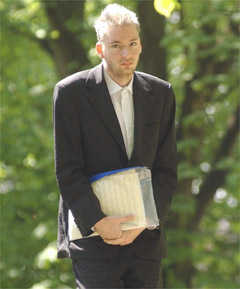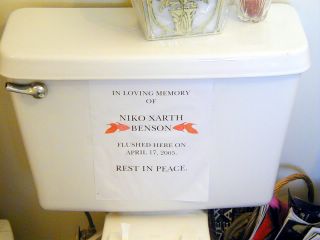Everything has a story.
I took a walk the other day. It was "Refuse Collection" day - trash day - and up and down the blocks surrounding my house people had put their
objects d'junque on the curb, never to be seen again.
What can you tell about someone when you look at their trash?
One house had assembled a used toy store, mostly pre-school stuff, colorful under a layer of toddler grime. Playschool houses, some games, a box or two of stuffed creatures. What prompted the trash? What happened that motivated this stuff - still useful - to become garbage? Did a little child grow up? Was this punishment for some infraction of family rules? Are people moving - a doctor gets relocated; a laid-off auto worker must find work elsewhere? Was there a divorce? Did a child die?
Another block revealed an organ. Small, cheap, maybe 20 years old, at one point a marvelous gift that made the recipient cry, but now superseded by keyboards that can sound like a choir or a truck or an organ. Who played the instrument? Did they stop, or did they upgrade?
There was a house which bore the remnants of a party. Hundreds of bottles. A dozen pizza boxes. What was the celebration? Who was there? Did they leave and drive home sober?
There was a house with four mirrors. All were in good shape, except one which had been broken at the curb. What happened to the occupant that forced a need to abandon these personality tools? Was there the purchase of better mirrors? Or was it a decision to stop looking? Stop caring? Stop obsessing?
One place had a nice couch. We have a couch with holes in it sitting in our living room. This couch was better. I almost thought about . . . But, no. Wrong color.
************************************************************************
In the last two weeks I have heard, from independent sources in vastly different situations and localities, stories of people who have been discarded by church. They had been carried to the curb.
What prompted the church, local or spiritual, to conclude that these individuals were disposable? How did it happen that they were determined to be refuse?
Some told about walking back from the dump to try again, only to suffer the same fate. Others had been recycled - reprocessed by a different brand, denomination, cult - but, like an empty milk jug, they ended up as trash again, one way or the other. All of these people shared one thing: a complete aversion to church. They had come to a place, a curb, and they made a deep, personal, spiritual commitment there. They had responded to a different call, an anti-altar call; they were running away from the church and vowed never to return.
You can tell a lot about a house by what they put on the curb.

